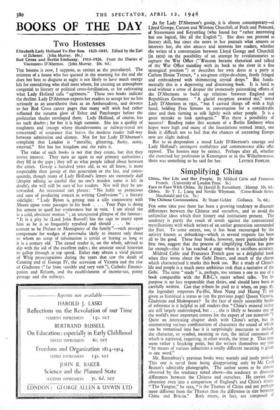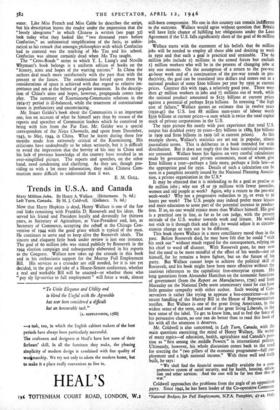Simplifying China
The Chinese Communists. By Stuart Gelder. (Gollancz. 7s. 6d.)
FOR some time past there has been a growing tendency to discount differences between the Chinese and ourselves, and to avoid the unfamiliar ideas which their history and institutions present. The tendency is partly the result of revolt against the conventional mystifications with which writers of an earlier generation surrounded the East. To some extent, too, it has been encouraged by the activity known as debunking—which in several respects has been all to the good. These four books, however more particularly the first two, suggest that the process of simplifying China has gone far enough—that it has reached a stage when it sacrifices accuracy.
Mildred Cable and Francesca French gave us a delightful book when they wrote about the Gobi Desert, and much of the charm which characterised it marks this book too. But a study of China's life and people is a much more ambitious task than a narrative of the Gobi. The term " study " is, perhaps, too serious a one to use of a book comparable with the B.B.C.'s easier school talks. Yet its purpose is no less responsible than theirs and should have been as carefully written. Can that tribute be paid to it when, on page 97, the legendary emperors Fu-Hsi, Shen Nung and Huang Ti are given as historical a status as (on the previous page) Queen Victoria, Gladstone and Shakespeare? In the face of easily accessible books of reference is it helpful to tell readers- that " China's mineral riches are still largely undeveloped, but . . . she is likely to become one of the world's most important centres for the export of raw materials "? Quite an interesting chapter deals with China's script, but in enumerating various combinations of characters the sound of which can be romanised into bao it is surprisingly inaccurate to include the character, or symbol, meaning to run, the initial consonant of which is aspirated, requiring, in other words, the letter p. That may seem rather a finicking point, but the writers themselves say that " by means of various inflections a totally different meaning is given to one word."
Mr. Rattenbury's previous books were warmly and justly praised. This one is saved from being disappointing only by Mr. Cecil Beaton's admirable photographs. The author seems to be almost obsessed by the tendency noted above—the tendency to discount differences between the Chinese and ourselves. He carries this . obsession even into a comparison of England's and China's rivers. " The Yangtze," he says, " is the Thames of China and not perhaps more different from the Thames than the difference in size between China and Britain." Both rivers,, in fact, are composed of . water. Like Miss French and Miss Cable he describes the script, but his description leaves the reader under the impression that the "lovely ideograms " in which Chinese is written (see page 32) look today what they looked like " two thousand years before Confucius," an unhistorical simplification of the facts, as unhis- torical as his remark that amongst philosophies with which Confucius had to contend was the teaching of Mo Tzu and his school. Confucius was almost certainly dead when Mo Tzu taught.
The " Cross-Roads " series to which Y. L. Liang's and Neville Whymant's book belongs is a uniform edition of books on the "history, aims and hopes of the warring nations." In China the authors deal much more satisfactorily with the past than with the present or the future. The condensation forced upon them by considerations of space is achieved with due regard to relative im- portance and not at the behest of popular treatment. In the descrip- tion of China's aims and hopes, however, propaganda comes into play. The summary of Kuomintang-Communist relations in the 1924-27 period is ill-balanced, while the treatment of constitutional issues is perfunctory and unconvincing.
Mr. Stuart Gelder's book about the Communists is an important one, less on account of what he himself says than by reason of the reports and speeches of Communist leaders which he contrived to bring with him from the Far East. Mr. Gelder was a special correspondent of the News Chronicle, and spent from December, 1943, to May, 1944, in China. What he learnt during those few months made him extremely critical of the Kuomintang. His criticisms have undoubtedly to be taken seriously, but it is difficult to avoid the impression that the brevity of his stay in China and his lack of previous knowledge of the country have resulted in an over-simplified picture. The reports and speeches, on the other hand, need condensing and clarifying. As they are, though pro- viding us with a lot more information, they make Chinese Com- munism more difficult to understand than it was.
E. M. Gum-



























 Previous page
Previous page